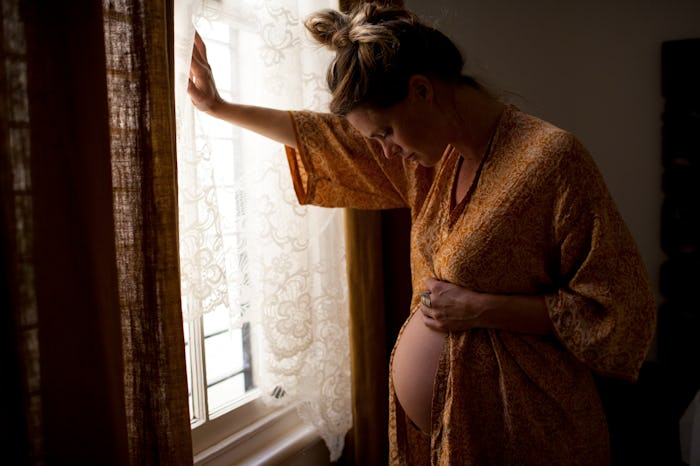Life

Can Your Water Break As You're Peeing? Experts Explain
When you’re pregnant and your water breaks, that moment is filled with mixed emotions — equal parts fear, relief, and shock. It can happen when you least expect it and when you’re minding your own business. Like when you're in your seventh middle-of-the-night pee break. Yeah, your water can break as you’re peeing. And yeah, pregnancy is full of so much liquid.
Only 15% of pregnant women experience their water breaking before going into labor, according to What to Expect, and most moms either have their water broken manually at the hospital, or it just naturally happens during labor. But if you’re one of the 15%, yeah, you can totally feel your waters break as you sit on the toilet.
OB-GYN Idries Abdur-Rahman tells Romper that this isn't that surprising — your water breaking can happen at any time anywhere, including when you’re urinating. OB-GYN Dr. Kameelah Phillips agrees, and says in an email interview, "The amniotic fluid will leak out of your vagina, while urine leaves your body through the urethra … these are two entirely separate systems." So since they are separate — and our bodies are so good at multitasking — of course your water can break while you’re peeing.
But how can you differentiate between urine and the amniotic fluid? Abdur-Rahman says that this is a concern of many of his patients and it can be difficult to differentiate between the two — at least at first. According to Phillips, amniotic fluid is a combination of baby urine, antibodies that prevent infection, proteins, and hormones. But obviously you won’t be able to see that with the naked eye. And the color of the amniotic fluid and your urine can be similar sometimes.
Forums on Baby Center and What to Expect also have a lot of moms reporting that amniotic fluid continues to gush long after they’ve finished urinating.
“If a patient is uncertain if she is leaking urine or amniotic fluid, I tell them to clinch the same muscles that they would clench to hold in urine or gas. If the fluid continues to leak, it is likely amniotic fluid,” Abdur-Rahman says.
“Amniotic fluid tends to either be clear or straw-colored, while urine will of course be yellow. Amniotic fluid does have a distinctive odor that is difficult to describe, but is nothing like the odor of urine,” he says.
So now that you know you're leaking amniotic fluid, should you do a mad sitcom-like dash to the car? Abdur-Rahman says that when your water breaks, that means prior to the leak, your cervix was likely dilated and thinned out, and that relatively regular uterine contractions have probably begun. “All of this is the result of increased hormones and the changes that they cause in your uterus and cervix.” He adds that labor does usually occur soon after the bag of water breaks, but not always. “For more than 90% of women, labor will begin within 24 hours of the bag of water breaking, and usually earlier. The earlier you are in your pregnancy, however (especially preterm), the time between the water breaking and the onset of labor may be longer."
If you’re not sure and are worried, there are amniotic fluid test strips and pads that you can get at most drug stores and retailers for this very moment. Or, once you think you’re finished urinating (and you’re sure your bladder is empty), you can use a regular pad and squeeze your kegel muscles to see if more fluid comes out. If it continues to saturate the pad, you’re probably in labor and need to get to the hospital or call your midwife immediately, noted Mayo Clinic.
If you’re unsure, it’s always best to contact your healthcare provider. They’ll be able to examine you and run some tests to see if you were just urinating or if your water broke.
Experts:
Dr. Idries Abdur-Rahman, OB-GYN, author of Everything You Ever Wanted to Know About Pregnancy (But Were Too Afraid or Embarrassed to Ask, and one-half of the Twin Doctors from TwinDoctorsTV.
Dr. Kameelah Phillips, OB-GYN and founder of OBaby Parent Education.
This article was originally published on